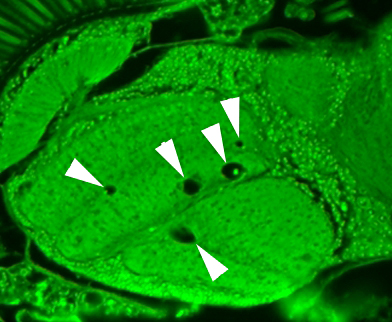Disruption of biological clocks causes neurodegeneration, early death
January 12, 2012

An increased number of "vacuoles" (holes) in the brain indicate neuronal damage and appear in fruit flies with disrupted biological clocks (credit: Oregon State University)
New research at Oregon State University (OSU) provides evidence that disruption of circadian rhythms can clearly cause accelerated neurodegeneration, loss of motor function, and premature death.
Prior to this, it wasn’t clear if the disruption of biological clock mechanisms was the cause or the result of neurodegeneration.
These studies were done with fruit flies, but the OSU scientists said previous research has indicated there are close parallels between them and humans. Some of the genes regulating circadian rhythms in flies are conserved (so important that they have been preserved through millions of years of separate evolution) and still do the same thing in humans.
The biological clock, in humans and many other animals, is a complex genetic mechanism tuned to the 24-hour day and regular cycles of light, dark and sleep. It influences a wide range of biological processes, from fertility to hormone production, feeding patterns, DNA repair, sleep, stress reactions, even the effectiveness of medications. In humans, researchers have found strong correlations between disrupted clock mechanisms, aging, and neurologic diseases such as Alzheimer’s and Huntington’s disease.
Holes in the brain
The fruit flies used in this research carried two mutations, one that disrupts circadian rhythms and another that causes flies to develop brain pathologies during aging. These double mutants had a 32–50 percent shorter lifespan, lost much of their motor function, and developed significant “vacuoles” or holes in their brains far sooner than flies with a functional clock.
The decline and loss of clock function may be just the beginning of a damaging circular process, said Jadwiga Giebultowicz, an OSU professor of zoology, member of the OSU Center for Healthy Aging Research and project leader. “When the biological clock begins to fail, rhythms that regulate cell function and health get disrupted, and we now know that this predisposes the brain to neurodegeneration. “But that neurodegeneration, in turn, may cause more damage to the clock function.
“A healthy biological clock helps protect against this damage,” she said. “When the clock fails, the damage processes speed up.”
Aging is closely associated with this process, Giebultowicz said, but it’s not clear exactly how. Molecular clock oscillations decline during aging. Finding ways to restore them might form a possible therapy for biological clock damage and help to prevent disease, and work in that area will be part of future research.
Ref.: Natraj Krishnan, et al., Loss of circadian clock accelerates aging in neurodegeneration-prone mutants, Neurobiology of Disease, 2011; [DOI: 10.1016/j.nbd.2011.12.034]